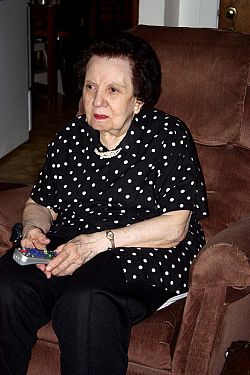Many elderly struggle to transition to digital TV

SALT LAKE CITY — "I don’t know what I would do without it. I’d go crazy," said Irene Mirabelli, 88, about television. She said she watches about two hours of television during the day and four at night. "I can’t do anything. I can’t do housework and I can’t walk. With my television I feel somebody is talking to me. It’s company." Mirabelli recently lost her husband of almost 60 years; and, although she spends a couple of hours in the morning with a lady who helps her take a bath and has "wonderful kids" who visit her and care for her, she still spends most of the day by herself. Yet, she is not alone The elderly watch more television than all other age groups with an average of 21 hours a week, or three hours a day. So, those elderly who cannot afford a converter box, cable service, or a newer television with a digital tuner, will not only miss out on their favorite programming, but will lack their main source of interaction with the world once the transition to digital takes place June 12. This is where Tomi Austin, a member of the Saint Vincent de Paul and Saint Ann parishes, comes in. She is collecting flat panels that people might be planning to get rid of to donate them to low-income elderly people in her community. "Seniors and disabled people are the ones who watch the most TV; they are also the ones least able to afford and adapt to the new technology. Many of these people are living, or struggling to live on below-subsistence level incomes." Austin said elderly people usually receive about $500-700 a month in Social Security grants. But, "I know some of these seniors may not take them for free and would want to pay something that will allow them to keep their pride, which is why I am trying to look for deals of around $100-150." Austin said she found great deals on the Internet, but that was after hours of searching. "I may not get enough donations of TVs to provide for those who want them, but people may be willing to sell their old ones to me for a small amount, or may be willing to contribute to the cause. I have been caring for or helping to care for quite a few elderly people… and I know how… important TV is in their lives," said Austin. Unfortunately, the converter box, a much less expensive alternative to buying a newer television or cable service, is not an option for many of the seniors. "Many have televisions so old they won’t work with the converter boxes because they don’t have the connectors," said Austin. With the right television set to receive a clearer, sharper image, seniors will be among those who benefit the most, especially those with macular degeneration, a disorder of the retina that causes gradual vision loss, said Janis Stanger, low vision therapist for the Utah State Division of Services for the Blind and Visually Impaired. "A larger screen and better clarity of the picture really helps them a lot." However, the bigger the screen, the better is not necessarily true for people with macular degeneration because they lose their contrast function and can’t tell the difference between colors. Clarity and contrast in the image are more important than size. But "A 30 to 40-inch screen is not too big for someone with macular degeneration," said Stanger. Mirabelli received a new and larger television for Valentine’s Day from her children and said the image is "clearer, brighter, and it doesn’t tire my eyes as much." So, she can watch more of her favorite channel: the Eternal Word Television Network (EWTN). Mirabelli said she enjoys watching Mass, the news, and reality television shows such as Dancing with the Stars and American Idol. "I’m interested in what is going on in the world and my country," she said. Studies have suggested that television replaces lost social contacts for the elderly and helps them maintain an ongoing sense of participation and social interaction. "When their old analog television sets go dark, I don’t want them to be staring at a blank screen with nothing to do; It would be terrible and sad for their — perhaps, only — companion to suddenly become silent," said Austin. "We must cherish and respect our elderly. They were the ones who made sacrifices for us, took care of us, and put us first. So, it’s our turn to reciprocate," she said.
© Copyright 2024 The Diocese of Salt Lake City. All rights reserved.

Stay Connected With Us